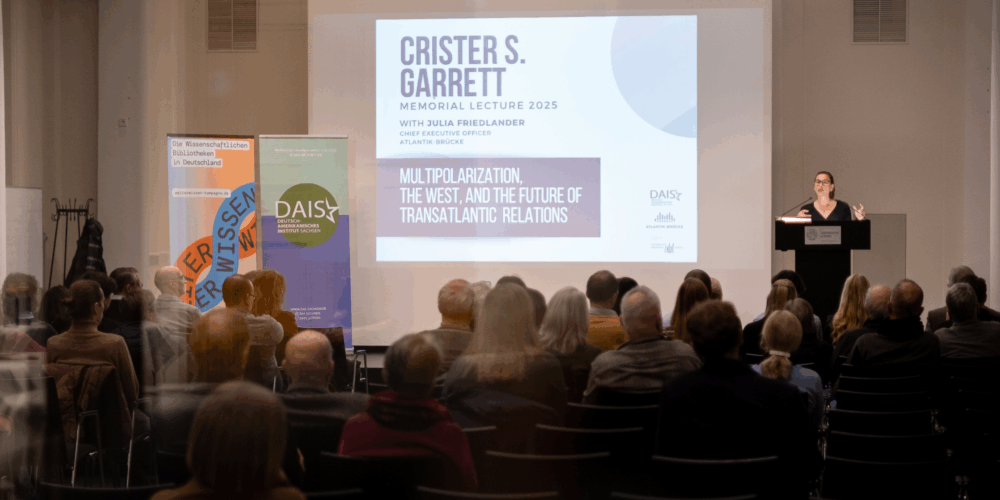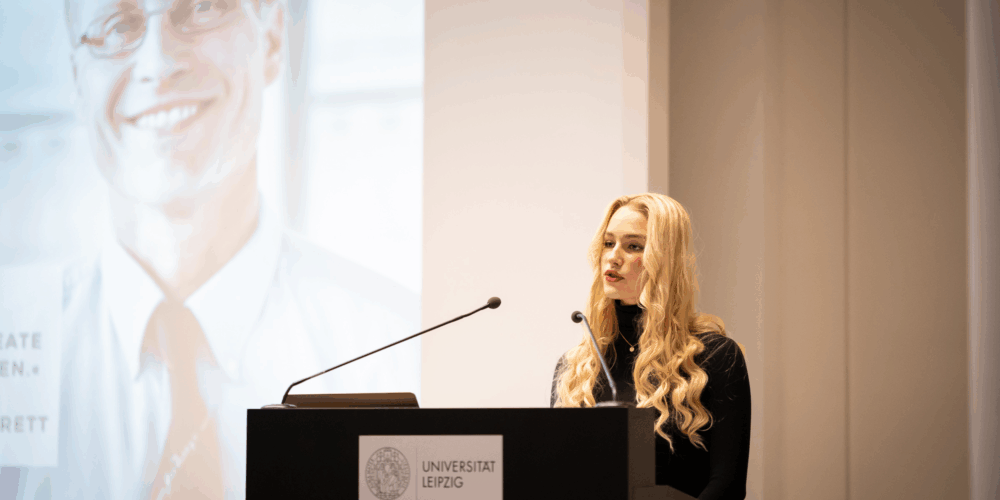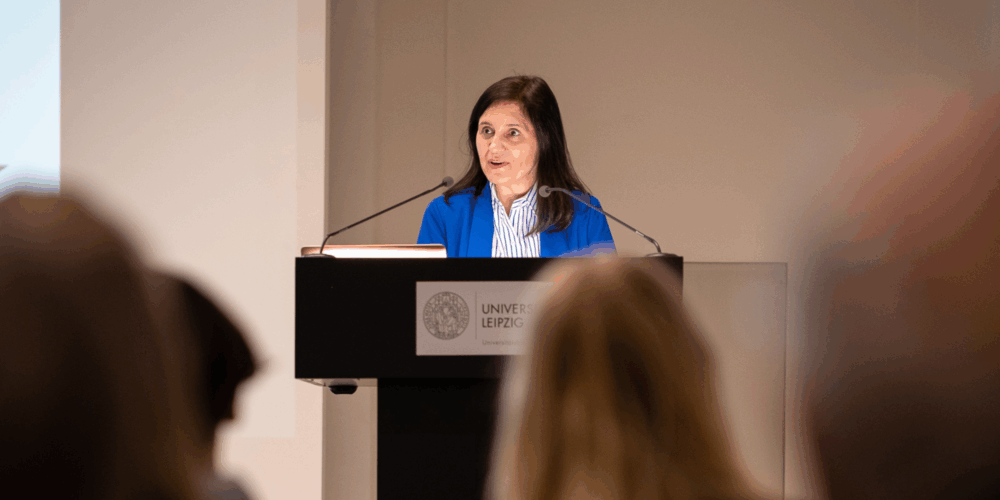„Trump may be a charlatan, but the people who voted for him are not.“
Julia Friedlander, CEO of Atlantik-Brücke, spoke on the topic of “Multipolarization, the West, and the Future of Transatlantic Relations” on the occasion of the third Crister S. Garret memorial lecture by the German American Institute of Saxony (DAI Sachsen). Read her full speech here.
Good evening. I am grateful to the University of Leipzig and the German American Institute of Saxony for extending me this generous invitation to speak with you this evening. It is in the spirit of a talented American professor who made his home here at this university, that I am honored to speak as an American whose professional life has also taken her to Germany, and as the first American CEO of the Atlantik-Brücke. Thank you to Sana Garrett for her heartfelt words about her father and his legacy in the transatlantic world, and to Jodi Breisler, the new Consul General from the US State Department here in Leipzig.
Let me start with a few words about my organization, which is over seventy years old. After the war, several Jewish refugees in New York returned home with the conviction that deep professional bonds with the United States were essential to establishing post-war West Germany as a democracy. One could argue there wasn’t much of an option, the US and its allies were occupying powers just as the Soviet Union was where we’re speaking today. Germany lay in ruins, and the only way back to growth and prosperity was to tie itself as closely to that occupying power. Yet our founders turned the circumstances of the American occupation into a strategic advantage. They were instrumental in convincing the Truman Administration to grant West Germany the Marshall Plan and to admit the new federal republic to NATO just a few years later.
“Protecting an institution means being willing to reform it.”
Since then, we have developed into Germany’s deepest professional network, with over a hundred events annually across Germany, the US and Canada, and increasingly throughout Europe. We also run four exchange programs for young professionals. The major changes underway in Germany, the United States, and globally are a focal point for our work and I am proud to say that our organization is booming. The fact that this network is a transatlantic one, is itself a product of West German history of the postwar period.
When you run a historical institution, you have to think back to the principles of its founding on a daily basis. What made your organization important then, how did it make its mark? But you also have to free yourself from the confines of its history. What makes an institution useful and powerful in one decade doesn’t necessarily translate in the decades that follow. Protecting an institution means being willing to reform it. That goes for all instructions, no matter how big and powerful.
A Small Economic Soapbox
Let’s stick with 1945 for a moment. It’s worth taking a few seconds to consider what the world looked like eighty years ago. The United States accounted for approximately half of global GDP. One quarter of the global population lived under British rule. A further twelve percent under the French. Global literacy rates hovered around 35%. There was no Israel. Dubai was just a pile of sand.
What’s the first thing that strikes you as I read down these facts? At the end of World War II, the world was still a Western world. Europe and America, and especially America, were able to craft a new global order and feel comfortable that the new institutions they created would remain fixtures of their own image. And that’s exactly what happened. We built the UN, which welcomed every country in the world, but it would be based in New York, and the permanent members of the security council would be the power brokers of that time: the US, France, UK, Russia, and China. The US would agree to pay by far the largest share of the UN, plus the World Bank and the International Monetary Fund. The lending institutions would be headquartered in Washington and issue credit according to Western standards, according to Western timelines, and in Western currencies. Generally speaking, we would be able to determine which projects deserved lending and which ones didn’t. It was multilateralism, but the kind where some voices simply count more than others. We were naïve to think it would remain that way.
“Western powers thought by granting China access to international privileges, it would follow directions. Boy were they wrong.”
How many of you are taking economics classes? One of the first things you learn about classical trade policy is Adam Smith and Ricardo. What do those guys say? That the opening of international markets and removal of trade barriers will bring an overall increase—and convergence—in public welfare, guided by market specialization and comparative advantage. It’s the trade bible. But our grandparents’ and parents’ generations failed to internalize that countries participating in this expanded global market would gain influence and clout over time. I suppose if you are standing in the shoes of postwar leadership, it’s not that hard to imagine being blinded by the overwhelming power of the United States and its allies. Even decades later, when China was admitted to the World Trade Organization, this kind of hubris still abounded. Western powers thought by granting China access to international privileges, it would follow directions. Boy were they wrong.
Today, the US is still the largest economy by far, but with a quarter, not half, of global GDP. The British and French empires have been gone for half a century. Global literacy is at 87%. And both Israel and Dubai certainly exist. When we talk about global power brokers, the list is a lot longer than the founders of the postwar institutions envisioned, and that weakens the inherent advantage of Western countries. They have started setting their own conditions.
New Kids on the Block
One of the most influential power brokers right now is another pinprick on the map: Qatar. In the long history of empire and geographic conquest, this one doesn’t fit the program. Enriched by oil and offshore gas, this tiny nation has positioned itself as mediator of the Israel-Hamas war. It has purchased shares of Western industries, entire stadiums and sports teams. It’s a tiny place, but it’s everywhere. Neighbor Saudia Arabia has rehabilitated its international reputation just a few years after facing sanctions for its brutal murder of the journalist Jamal Khashoggi. Just yesterday, the government gained concessions from the White House on major weapons sales that Washington had long opposed. The government is pouring itself wealth into a modernization of the state, drawing an astounding amount of global attention. Have any of you heard of “Neom,” the supposed futuristic 170 kilometer city-in-a-line that they are building in the desert? If that sounds like science fiction to you, then the effect is working. The more the buildings look like UFOs, the better.
What about Asia? Japan used to be the only real rival to Western economies. The rise of Japanese vehicles in the 1980s was in fact what turned Donald Trump into a “tariff man” and convinced him that other countries were using open trade to suck up America’s wealth, a sentiment common today across the political spectrum. But now Japan is an old power like Germany, and growing economies Vietnam, Indonesia, and Malaysia dominate supply chains and your product labels, take a look. And by that I don’t just mean your t-shirt, I mean your car and your iPhone. And if Taiwan stops producing microchips, the world will ground to a halt.
The meteoric rise of China was the biggest blessing to Germany in the aftermath the eurozone crisis ten years ago. If it weren’t for the so-called BRICS countries, as we called them then, Brazil, Russia, India, China, and South Africa—who were growing rapidly and hungry for European products, then the stasis currently facing the Germany economy would have come to roost much sooner. But European producers thought they was just so good at making things that China could remain the factory floor for their own production. They didn’t foresee, and then they learned to actively ignore that Beijing would steal intellectual property, acquire companies to copy their patents. And, setting aside any specific malign intent, they might simply outcompete and make better products at a fraction of the cost.
So how about that Western world? It looks a hell of a lot more complicated.
Reboot, Reload
For younger generations, institutions like NATO and the European Union are self-explanatory, they are thing things that we read about in school and university, their founding is described like the Roman Empire, as if they have existed just as long as the Coliseum. They are fixtures in our lives. Institutions tend to build big imposing buildings to emphasize their permanence and their power. But the truth is, they all started out as somebody’s bright idea. NATO started with ten members, now it has thirty-two, and is the greatest military alliance in history. The EU started as an ad-hoc arrangement between France and Germany to regulate coal and steel production. Now, I don’t have to tell any of you, it has evolved into the greatest supranational organization in history.
The best institutions change over time, they adapt to new circumstances. If they don’t, they risk becoming empty shells and eventually losing legitimacy altogether. This is a real risk for what European leadership, and up until recently, US leadership liked to refer to as the “rules-based international order.” If the UN doesn’t amend the structures of the security council to reflect the wide field of geopolitical voices, then other formats of international negotiation will emerge. Right now, in fact, the negotiations on the margins of United Nations meetings are much more important than what happens in the plenary itself. Who will make room for Nigeria, Africa’s most populous nation? Or Brazil, the powerhouse of Latin America? Those countries will look elsewhere, and who will blame them for it?
The WTO has lost tremendous influence over the management of global trade because its rules are no longer equipped for the economy it meant to serve. After all, there was no digital trade when it was founded, nor did the world’s second largest economy, China, so blatantly ignore so many of its principles. The WTO still exists in Geneva, it maintains a big staff and ambassadors, but global trade rules are being renegotiated by ad hoc arrangements between new constellations of countries. Many of these countries are no longer looking to send as many products around the world as quickly as possible at the lowest price. They are prioritizing security of supply and linking trade to national security. The United States, long discouraged by the framework it itself created in the 1980s, is seeking a new set of global rules, creating trade policy on a roller coaster: up and down and around, until every gets dizzy.
What comes next?
My grandmother used to tell me often, nothing in life is self-evident. She was referring to the unexpected turns in her own life, but she also talked a lot about politics. Many of the things you grew up with can change quickly. On the personal level, that could mean a death in the family, the loss of a job. But on a macroeconomic level, on a geopolitical level, it means that societal constants are not constants at all, and that we need to be ready for change. Because Germany is so exposed to the world economy, the multipolar shifts I’ve just described have a direct impact on how much money this university has to provide your education, not to mention the job you apply for when you’re done.
How are our politicians so far handling these multipolar shifts happening around us? It’s a mixed report card. No politician delights in delivering bitter pills to the electorate—it’s not an easy way to win an election by admitting the need to cut social services, raise taxes, or make economic reforms that will create losers in industry and the workforce. Most try to muddle through and mitigate losses on all sides, which is understandable. When you’re at the decision table that probably seems like sensible governance. But voters are not stupid—they can smell uncertainty and see bandages placed over big problems—and that’s when we come to a breaking point.
“It’s ok to demand a little revolution..”
Frustrated with the broken promises of traditional leadership of both parties in the United States, voters went for Donald Trump–twice. To be clear, Trump may be a charlatan, but the people who voted for him are not. Here in Germany, I struggle to see a concrete offering from the AfD, the “alternative” seems like a destructive force built on the amplification of prejudice, with nothing behind it. AfD voters, I fear, are buying a false set of promises, just like in America.
To be clear, it’s not wrong to question how governments function or whether politicians are in touch with the interests of voters or lost in their own internal logic; it’s not wrong to question how the private sector functions and whether employment opportunities are as good as they should be; it’s not wrong to question if you think big tech is a good thing or a bad thing, if you think journalists are doing their job or becoming click-baiters, and my current favorite: it’s not wrong to question whether artificial intelligence is making you smarter or more stupid.
Why are centrist political forces losing steam? For one thing, politicians are now answerable to us on an hourly basis. Social media has democratized reporting and made everybody a legitimate public critic—you, me, the guy on the corner, everyone. The Bundestag has a glass dome to signal that you can look down inside it and see what your government is doing. But the architects never envisioned Instagram as a new form of transparency. More than ever, it’s clear that politicians are no titans, they’re just people.
And if politicians are not titans, then I wish they has the self-confidence to say: look, we have to decide between two bad options, a and b. This is where we stand, this is the problem we have to solve, and this is why we are choosing a, and not b. Instead, they often pretend that their chosen path was self-evident from the beginning. In this age of new transparency, everyone knows that’s not true. That makes them seem disconnected from reality, to the benefit of the political extremes.
Institutions need honesty. And institutions need reform. As I’ve learned in over a decade in public service and now in Berlin running a historical institution, it’s ok to demand a little revolution. Let me leave you with a few mantras that I say to myself whenever I feel challenged, especially challenged by the current political environment.
If someone rejects your idea because “we’ve always done it this way,” challenge that person. You may end up being wrong. But more likely, you will end up with a compromise.
Show up where you are not expected. The best conversations I have had are with people I know don’t agree with me, who are outside my bubble. Not everyone is who you think they are. Picture somewhere where you don’t feel in your element. Go there, sit down, and talk to whoever is next to you. You may end up with a beer in your hand.
The louder someone yells, the weaker the argument is. People don’t yell if they can get their point across without yelling, and intimidation is a form of weakness. If someone yells at you, keep your voice steady. If you can avoid escalation, you’ve already won.
Be the person who explains the difference between a and b. Don’t be a slave to your algorithm, you won’t hurt its feelings. Simple explanations for big problems are almost always not the whole story.
Be resourceful. The current moment demands ingenuity, and it’s unlikely the opportunities in life will appear twice. We lead lives of great privilege, in a democratic society. All of the big issues we’re talking about today are not cause for desperation or a blame game—that’s the cheap route. They demand persistence and creativity. And I hope we’ll all do our part. Thank you for your attention today, and I look forward to any questions.








